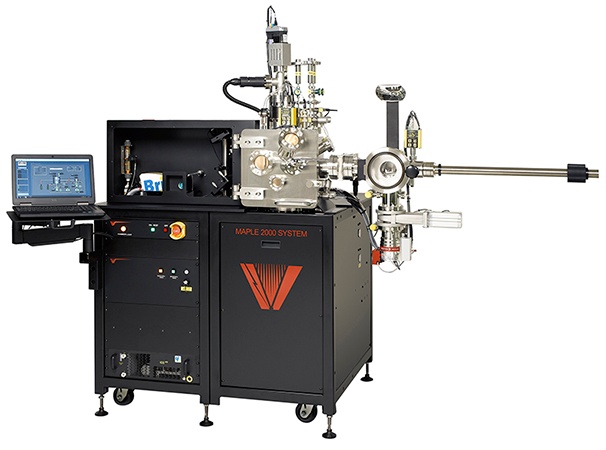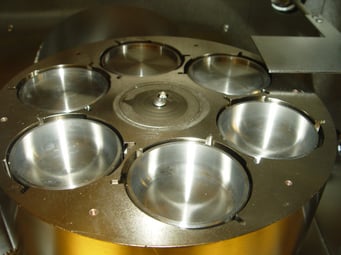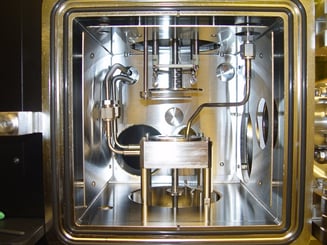Matrix Assisted Pulsed Laser Evaporation (MAPLE) was developed at the Naval Research Laboratory during 1994 using excimer lasers to deposit polymer thin films. MAPLE has evolved considerably over the years. Commercial MAPLE systems are now readily available with IR Lasers and multi-target manipulators. MAPLE is described in the following publication:
Greer, J.A. "Design challenges for matrix assisted pulsed laser evaporation and infrared resonant laser evaporation equipment." Applied Physics A: Materials Science & Processing, Volume 105, Number 3, 661-671.

One 2-inch diameter substrate or multiple small samples. Larger substrates and custom substrate holders are available on request.
300°C max is typical for polymer-based materials, but other heaters are available.
-194°C (80 K). Target temperature will be about -130°C
Base pressure depends strongly on polymer/solvent mix and the solvent vapor pressure.
A single 1.5-inch diameter target is standard, larger targets are available on request.
This can vary from one target to six targets or more.
Variable from 2.5 to 4 inches
Across complete MAPLE target
Of the laser beam on target: 60°
P < 5 x 10-7 Torr guaranteed with system at room temperature and no polymer/solvent mix.
Box-style chamber with easy substrate and target changes.
PVD offers a wide variety of lasers to use with MAPLE and RIRPLE. These lasers can operate at fixed wavelengths such as 1.06 microns or 2.9 microns, or variable wavelengths in the IR. Please contact PVD for details.
In the MAPLE process, the desired polymer/solvent mix is frozen inside of a deposition chamber.
The polymer/solvent mixture is injected into a cup surrounded by a large copper reservoir, which is then filled with liquid nitrogen which freezes the mixture. The frozen mixture then acts as the target for an incident pulsed laser beam.
Using a pulsed laser, a small section of the frozen target will be evaporated in a very short period of time, throwing a small section of the mixture into the vapor phase. The polymer material directed at the substrate will then be deposited while the solvent is pumped away (if you choose the correct solvent). This process has been used to successfully deposit a wide variety of polymer and biological thin film materials.

A six position MAPLE and RIR-PLD target holder cooled with LN2. Assembly can index and all targets rotate. Located at Jefferson Labs and used with the FEL.
The original MAPLE work utilized an excimer laser, but IR lasers provide much better polymer film quality. The reason is the energy per photon for excimer lasers operating at 248 nm (KrF) is ~5.4 eV. This is enough energy to break polymer chains and ligands and reduce the functionality of the deposited polymer materials. PVD Products' MAPLE systems utilize an Er:YAG laser that operates at 2.9 microns where each photon has only about 0.3 eV of energy. Thus, polymer functionality remains intact since the polymer chains are not fractured by the low energy photons. The strong absorption of water at this wavelength makes it a good solvent material in many cases. PVD Products can also provide systems with alternative lasers.
PVD Products' MAPLE system utilizes a unique injection process that allows you to freeze your polymer/solvent mix in-situ after the chamber has been purged of water vapor and other gasses. Our MAPLE systems utilize a quick target cool-down and quick target heat-up assembly to maximize throughput. Our rotating LN2 cooled target holder assembly makes excellent thermal contact with the cooling block cooling the polymer/solvent mix to well below -170°C.
PVD's MAPLE system is built around our popular box-style Nano PLD chamber with large hinged front door for easy access to the internal components. This provides for easy sample transfers through the front door. The systems come complete with a fully enclosed optical train and laser beam rastering, turbo pumping package, and laptop computer control utilizing LabVIEW software. Valve packages can be manual or all electropneumatic as required. A wide variety of standard options are also available.

Inside the single target MAPLE system
"PVD is genuinely interested in helping me advance my capabilities for thin film deposition with an instrument that fits my applications best."